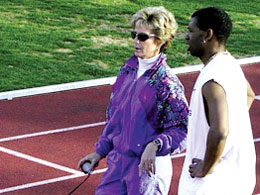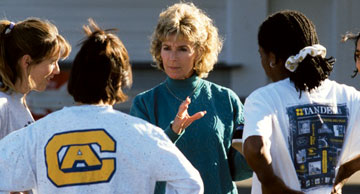Volume 28 · Number 1 · Fall 2010
Sports
Deanne Vochatzer
Interim head women’s track and field coach (1989)
Head women’s track and field coach (1993–2010)
Head women’s cross country coach (2006–07)
By the numbers
- 78 All-America awards as head coach
- 5 Northern California Athletic Conferenc
- Coach of the Year awards
- 5 California Collegiate Athletic Association Coach of the Year awards
- 5 West Region Division II Indoor
- Coach of the Year
- 3 West Region Division II Outdoor
- Coach of the Year
- 1 National Division II
- Coach of the Year (1999)
Career Achievements
- Assistant coordinator of women athletes, U.S. Olympic Festival (1982–87)
- Coordinator of women athletes,
- U.S. Olympic Festival (1987–1994)
- Head coach, World University Games
- (1994, 1995)
- Head coach, U.S. Olympic Team (1996)
- Director of competition, U.S. Olympic Trials (2000)
- USA Track and Field Joe Robichaux Award (2001)
- Inducted into U.S. Trade Coaches Association Hall of Fame (2002)
- USA Track and Field Special Service Award (2005)
Finish Line: Dee Vochatzer

Dee’s Memories
What I’ll miss
“I have been at other institutions, and UC Davis is truly different. We really strive to make sure our student-athletes have a balance. Yes, I want to win. Yes, I want them to run fast, jump high or throw far. But I also want them to find that great balance so if they have a crummy day on the track, they can focus on their academics. The challenge of having them achieve that balance was special.”
Being a teacher and a coach
“I have to bring the energy and the passion, I have to be on top of my game so that I don’t miss the teachable moments. We try to make sure that everybody steps up and brings the best they can each day to practice. We hold them accountable whether they do or they don’t.”
Coaching the 1996 Olympic team
“It was such a life-changing experience. It was the Centennial Games. It was at home, in Atlanta. The expectations were enormous. The fear factor of screwing something up was heightened for me, being a female. That was only the third time a woman had coached a U.S. Olympic track and field team. So I’d walk into the technical meeting where there wasn’t one other woman head coach among 197 countries and I’d think, ‘I’d better get this right.’ As an athlete, you dream of being on the Olympic team, and I came close. And now I was on the other side as the coach, and I knew that this would forever change their lives. I will say this: It was the greatest experience in my life. I would not have passed it up, but I would also never do it again.”

Impact at home and at UC Davis
“I was taking red-eyes at least two weeks a month, sometimes three, going to Atlanta or to Colorado Springs or wherever our meetings were. And yet I was trying to stay plugged into the [Aggie] program. It was an exciting time for the program because the team shared in it. I remember telling Jon, ‘There won’t be any groceries in the refrigerator, there won’t be any laundry done or beds made.’ I wasn’t going to be here.”
On the husband/wife tandem
“The one good thing about these crazy jobs is that we know we’ll end up at the same place at the end of the day. And you know what the other person is doing. In the athletics business, those god-awful weekends can be really hard on a relationship and a marriage. So that’s one thing where we’ve made it work. In a lot of ways, it’s a blessing. The stress isn’t there because we both know what’s going on.”
Coaching two NCAA Women of the Year recipients
“The biggest difference between coaching men and coaching women is getting women to take a risk. That particular group? Highly successful students. All of them had stellar GPAs. Asking them to risk failure is one of the biggest challenges I’ve had as a coach, but I’ve also never had a group respond like that one group responded.”
